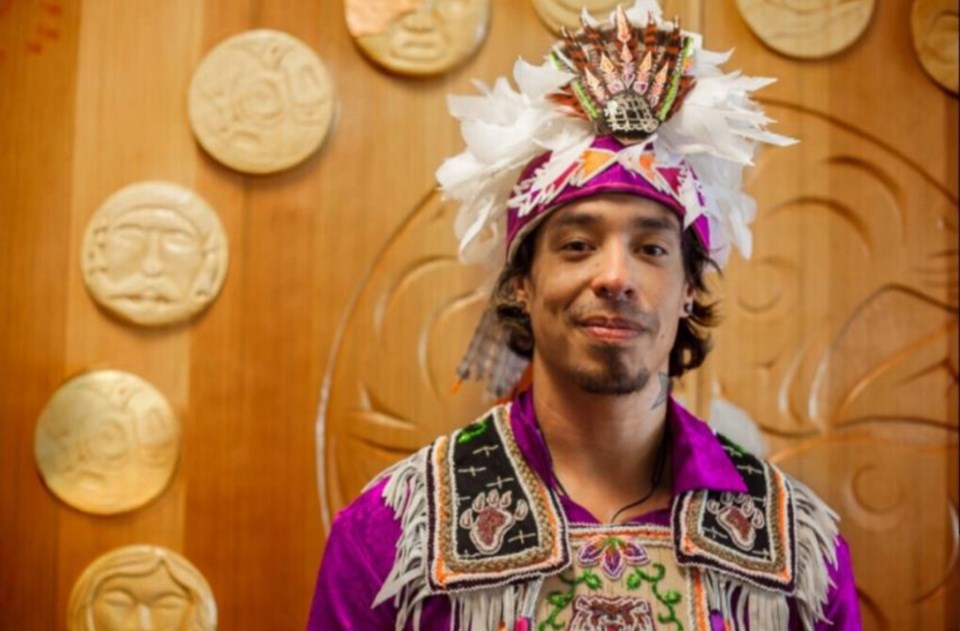“It’s going to get weird.”
Teka Everstz, with a laugh, sums up the workshop he’s bringing to Calling Them: From Within is taking place Saturday, April 27 at 1 p.m. in the Anvil Centre.
“Weird” is one of the three descriptors he uses when he gives the in-a-nutshell overview of his workshop – along with “awe-inspiring” and “is this really happening right now?”
Which means, whatever preconceived notion you have when you hear “literary workshop,” you’ll probably want to throw that idea out the window before you sign up for Everstz’ session.
Everstz is a member of the Bear Clan of the Kanien’kehaka Mohawk Nation of Kahnawake, Quebec. His workshop is grounded in the idea of archetypal beings, such as those in Indigenous storytelling traditions who are seen to bring the world into existence.
As a workshop synopsis says: “This is an opportunity to pay recognition and respect to the beautiful beings whose life forces continue to exist deep inside of us, and whose actions continue to shape and create the world we live in today.”
Lest you think the subject matter sounds esoteric, Everstz is quick to note that the workshop is designed for everyone – storytellers, yes, but not just writers. It’s also for those who work in any other art form or those who are simply curious, at all experience levels.
“Really, ultimately, the workshop is for anybody looking to take another deep dive into their own creative space,” he said.
The premise of the workshop is straightforward: Each person is asked to think about a person who is a mentor to them. Wearing masks, participants then begin to “act out” their mentor: to walk, move and occupy space like them as they think about their mentor’s strengths and vulnerabilities – without using words.
“When someone puts on a mask, you are immediately leaving your personality at the door,” Everstz noted. “When you put the mask on, in many senses, you’re giving yourself almost like a space of protection. You’re not yourself anymore. You’re also giving yourself permission to be something that you’re not.”
Through this “body conversation,” participants then begin to find those whose movements are aligned with their own, and Everstz begins to corral the participants into groups based on similarity in type.
Everstz notes there are certain types that recur in just about every workshop: the high-energy, in-your-face ones; the calm and slow ones; the wallflowers.
Each group then has space to debrief; to talk about their mentor and to begin to understand the characteristics that they all share. From there, the mask work comes back into play as each group is given a chance to embody who their shared being is, without talking. One by one, the groups leave and come back in to the room, as that one being, to greet the other participants.
“This is where it just gets weird,” Everstz said. “All I can do is hold space. All I can do is invite this being in. … It’s so powerful to see the group of people turn into that one being.”
The other participants, meanwhile, speak to the new being.
“We actually get to ask them: What is their fear, what are they here for, what is their role? Why are they who they are?” Everstz said. “These participants … are asking: what do you recommend? What’s some wisdom that you could share with me?”
What exactly happens in the workshop is never the same twice.
“You kind of get the same archetypes that magically come out, but how they present themselves, how they speak, how they engage, how they answer that question … You’ll never get the same.”
For Everstz, the hope is that the experience will strengthen a creator’s ability – working in whatever medium – to speak not just to a character, or to an emotion, but to wake up an archetype from within.
“It’s so awe-inspiring that it will leave you with this greater sense of self, a greater curiosity about the psyche and just how our stories draw out certain archetypes. What type of archetype are we trying to wake up within our story when a person reads it? Who is it speaking to?”
Archetypes, he said, are fundamental to storytelling – although many of us may not recognize them.
“Everyone kind of relates to a Disney movie; they’re a cathartic experience, and why is that? It’s because it’s tapping into something that’s really core to who you are, and your bloodline, and your family story. …
“It’s getting into the very archetypes and the very being of who we are. It’s tapping into bloodline experience, bloodline memory, DNA memory that we still yet have come to understand.”
Though Everstz said growing up steeped in Indigenous tradition and ways of being has likely heightened his ability to connect to connect to the power within, he said the quest to connect people to their own roots, within themselves, is the same regardless of that person’s background.
“From Zimbabwe to Gothenburg, Sweden; to Nairobi, to New Westminster, it’s just having people connect with their knowledge base, having them connect with their bloodline memories, having them connect with their bloodline stories, the archetypes that have been in their ancestry.”
Everstz is excited to put his workshop on alongside the other LitFest offerings, many of which are focused more on what he calls “mastering the craft of word.”
“This is taking it even further down beyond storytelling,” he said. “It’ll bring a different space in. It’ll allow for the writer, the creator, the storyteller to kind of take a pause from the actual technical, take a pause from the creative, take a pause from the artistic and just hold space to be deep within themselves in a way that I’m sure many have not yet experienced.”
Ěý
*
For full LitFest New West details, see .Ěý
Ěý
Ěý


